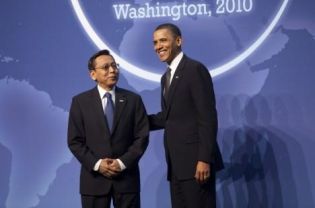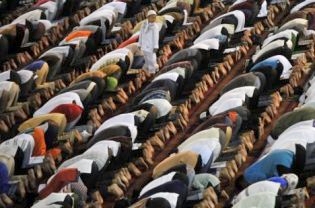 |
INDONESIA |
Indonesian Vice President: Stand Up Against Radicals
Ulma Haryanto & Anita Rachman | October 18, 2010

Indonesian Vice President Boediono, left, with United States President Barack Obama at the Nuclear Security Summit in Washington DC in April. In the strongest comments by a senior politician yet against creeping radicalism, Boediono said the country must not abandon the basic principle that guarantees religious freedom for all. (EPA Photo)
Jakarta. Vice President Boediono has received cautious praise after calling on the “silent majority” to take a stand against a growing radicalism that he describes as threatening to take the country down a path of destruction.
“Once we allow radicalism to take over our way of thinking, it will lead us toward destruction,” the vice president said in a speech on Saturday at the opening of the Global Peace Leadership Conference, organized by Nahdlatul Ulama.
“Freedom of expression has been used by certain groups to spread hatred,” he added.
Though racism and interreligious conflict are fundamental issues that exist in most societies, Boediono said, Indonesians should protect the foundation upon which the country was built — the principle of unity in diversity. “Although Islam is the religion of the majority of people, Indonesia is not an Islamic state,” he said.
Boediono said the country must not abandon the basic principle that guarantees religious freedom for all.
To do this, he called on the silent majority to take a stand. “Radicals are usually vocal, though they are few in number. They drown out the silent majority,” he said. “But there are times when the silent majority must dare to speak out. We must loudly reject radicalism and return to the original agreement of the founding fathers of the nation.”
Pluralism advocates applauded him for speaking out strongly on a threat they have long warned of but that officials have paid little attention to. Week after week, stories of discrimination against minority religious groups fill news pages, and several surveys have pointed to a worrying increase in intolerance among Indonesians.
Dhyah Madya Ruth, chairwoman of Lazuardi Birru, a group that aims to educate young people about the dangers of extremism, said it was important that the government made a clear stand.
“We have to create a synergy between the government, the people and civil society organizations in solving this problem,” she said. “Most important in this is not just the silent majority, but the silent government has to make a firm stand.”
Burhanuddin Muhtadi, an analyst from the Indonesian Survey Institute (LSI), said that President Susilo Bambang Yudhoyono had never strongly addressed radicalism.
In August Yudhoyono decried “groups that threatened the nation,” but his vague message could not be grasped by the public, Muhtadi said.
“He is too focused on his own image. He doesn’t want to be considered antagonistic toward Islamic hard-liners.”
Another important government figure who needs to stand up against those who promote hatred is the religious affairs minister, said Ulil Abshar Abdalla, the founder of the Liberal Islam Network and a Democratic Party politician.
“For example, in several Islamic gatherings people openly call for the banishment of [minority Islamic sect] Ahmadiyah. That should not be allowed,” he said, adding that he regretted that Religious Affairs Minister Suryadharma Ali had adopted a conservative approach that fostered radicalism. Suryadharma has openly advocated banning the Ahmadiyah sect.
Copyright 2010 The Jakarta Globe
URL: www.thejakartaglobe.com/politics/indonesian-vice-president-stand-up-against-radicals/401881
“Once we allow radicalism to take over our way of thinking, it will lead us toward destruction,” the vice president said in a speech on Saturday at the opening of the Global Peace Leadership Conference, organized by Nahdlatul Ulama.
“Freedom of expression has been used by certain groups to spread hatred,” he added.
Though racism and interreligious conflict are fundamental issues that exist in most societies, Boediono said, Indonesians should protect the foundation upon which the country was built — the principle of unity in diversity. “Although Islam is the religion of the majority of people, Indonesia is not an Islamic state,” he said.
Boediono said the country must not abandon the basic principle that guarantees religious freedom for all.
To do this, he called on the silent majority to take a stand. “Radicals are usually vocal, though they are few in number. They drown out the silent majority,” he said. “But there are times when the silent majority must dare to speak out. We must loudly reject radicalism and return to the original agreement of the founding fathers of the nation.”
Pluralism advocates applauded him for speaking out strongly on a threat they have long warned of but that officials have paid little attention to. Week after week, stories of discrimination against minority religious groups fill news pages, and several surveys have pointed to a worrying increase in intolerance among Indonesians.
Dhyah Madya Ruth, chairwoman of Lazuardi Birru, a group that aims to educate young people about the dangers of extremism, said it was important that the government made a clear stand.
“We have to create a synergy between the government, the people and civil society organizations in solving this problem,” she said. “Most important in this is not just the silent majority, but the silent government has to make a firm stand.”
Burhanuddin Muhtadi, an analyst from the Indonesian Survey Institute (LSI), said that President Susilo Bambang Yudhoyono had never strongly addressed radicalism.
In August Yudhoyono decried “groups that threatened the nation,” but his vague message could not be grasped by the public, Muhtadi said.
“He is too focused on his own image. He doesn’t want to be considered antagonistic toward Islamic hard-liners.”
Another important government figure who needs to stand up against those who promote hatred is the religious affairs minister, said Ulil Abshar Abdalla, the founder of the Liberal Islam Network and a Democratic Party politician.
“For example, in several Islamic gatherings people openly call for the banishment of [minority Islamic sect] Ahmadiyah. That should not be allowed,” he said, adding that he regretted that Religious Affairs Minister Suryadharma Ali had adopted a conservative approach that fostered radicalism. Suryadharma has openly advocated banning the Ahmadiyah sect.
Copyright 2010 The Jakarta Globe
URL: www.thejakartaglobe.com/politics/indonesian-vice-president-stand-up-against-radicals/401881











